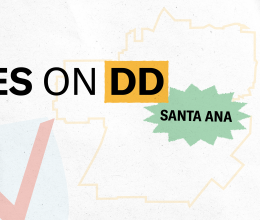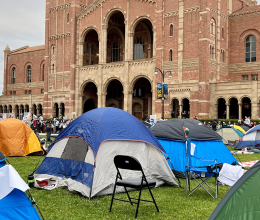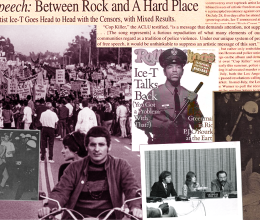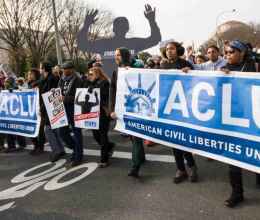In response to acts of mob violence on UCLA’s campus last night, the ACLU Foundation of Southern California sent a letter to UCLA Chancellor Gene Block denouncing efforts to suppress the peaceful right to free expression and dissent.
Dear Chancellor Block:
The ACLU Foundation of Southern California is extremely concerned that UCLA has failed to protect the rights of peaceful protesters who were targeted by horrific acts of mob violence last night, and that the University seems poised to exacerbate the situation by dismantling the students’ Gaza solidarity encampment and subjecting protesters to possible disciplinary measures. Last night’s violence was intended to intimidate and silence protesters. The University should not contribute to those efforts any more than it already has. As set forth below, we urge the University to protect students’ right to protest on campus and to refrain from taking any further measures to suppress student speech on campus.
According to news and other reliable reports, a group of at least 100 people who were armed with fireworks, bear spray, and handmade weapons descended on the solidarity encampment late last night and violently assaulted many of the protesters and some journalists. These people were not counterprotesters exercising their First Amendment rights; they were committing acts of violence that are completely unprotected by the First Amendment.
The University knew, or should have known, that the students who were protesting for Palestinian rights would likely be the targets of escalating violence. Students in the encampment had already been subjected to multiple aggressive confrontations earlier in the week. The University steadfastly refused to protect their rights even when individuals had in the nights before April 30 attempted to forcibly break encampment walls, threatened to slit protestors throats, and released vermin near the encampment.
Last night’s coordinated assault should therefore not have been a surprise. Indeed, the University’s inaction may have sent a message that it would tolerate violence against the pro- Palestinian students and may have therefore opened the door to that violence. In the wake of last night’s attacks, any attempt to equate violations of University time, place, and manner restrictions with the violence that was visited upon protesters at the encampment would be beyond the pale.
A core mission of a university campus is to create a space for students and scholars to learn, debate, and express themselves. History shows that institutions of higher learning have served as critical spaces to contest ideas, critique mainstream orthodoxies, and encourage dissenting voices. One of the key functions of free speech is “to invite dispute,” a characteristic of freedom that is perhaps best expressed at a university setting. Terminiello v. City of Chicago, 337 U.S. 1, 4–5 (1949). It is a feature, not a failure, of free speech that “it induces a condition of unrest, creates dissatisfaction with conditions as they are, or even stirs people to anger.” Id.
It is little surprise, then, that university campuses across the country have been swept up by protests about the war on Gaza. As one of California’s flagship public universities, UCLA has legal and historical obligations to protect students’ ability to peaceably speak and protest on campus, regardless of whether the students demand Palestinian freedom or support Israel’s war in Gaza. And these obligations must extend beyond what the First Amendment merely allows. The Constitution prohibits censorship, but UCLA can and must encourage dissent.
While the university can generally impose certain content-neutral rules on its campus, it must exercise the utmost restraint when enforcing these technical requirements against students engaged in protected speech on a matter of great public concern. UCLA’s threats to discipline, suspend, and expel peaceful student protesters for violations of these technical rules betrays its role in encouraging student expression and free thought, even if they do not violate the Constitution. And any attempt to deploy law enforcement against peaceful protestors, as we have unfortunately witnessed across the country, only hurts this mission and places students at even greater risk. We urge the administration not to resort to police action to suppress student expression and shut down the encampment. Instead, UCLA should do more to protect student speech from violence and intimidation, including by creating a safe venue for actual counter protestors (as opposed to violent assailants) and taking a more active role in ensuring that all student expression (regardless of viewpoint) is allowed to continue without interference.
The administration exhibited an attitude of indifference to the legitimate threats and harassment faced by protestors, with predictable consequences that exploded into public view last night. By refusing to do anything to protect students who were protesting in solidarity with Palestinians over the past few days, the University has effectively taken the side of people who have attempted to violently suppress the speech of those in the encampment. The violence is, in part, a result of the University’s failure to act.
Any attempt by UCLA to clear the encampment now would mean that the University is picking up where the mob left off, taking additional measures to silence the peaceful speech of its students. Such an effort to shut down this particular type of activity in this context, after having demonstrated tacit approval not only for speech but also for violence that is directed against people in the encampment, would easily be understood as a form of viewpoint discrimination against pro-Palestinian speech.
We therefore urge the university to take all necessary measures to protect students’ right to protest—especially when that right is under violent assault—and to refrain from taking any further measures to suppress student protest on campus.




